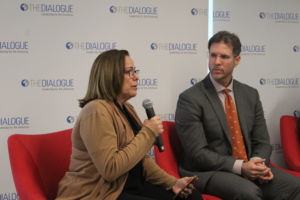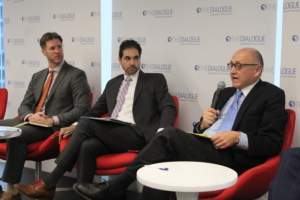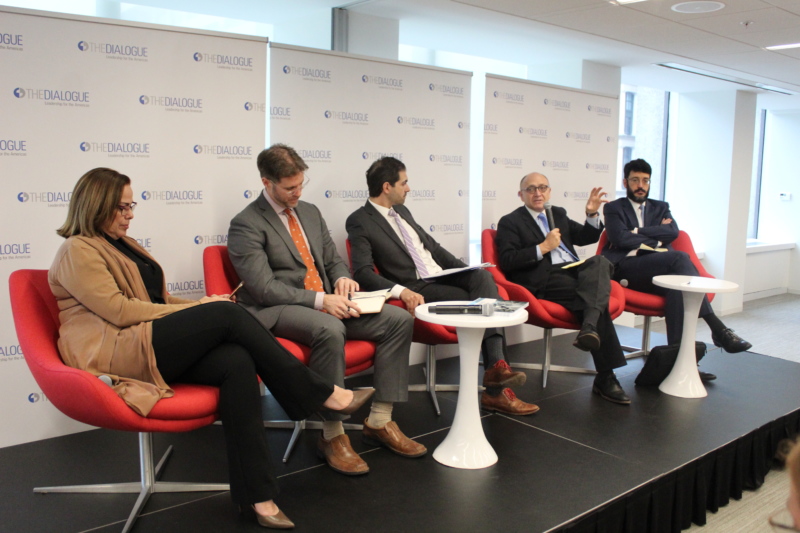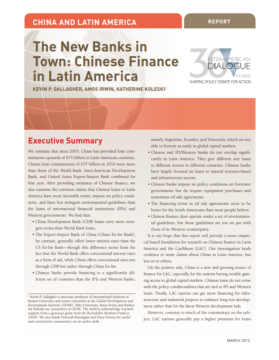Colombia-Venezuela Relations: What Are the Prospects?
Colombia and Venezuela have a history of rocky relations characterized by short bursts of improvement and deterioration.
On May 9, 2019, the Inter-American Dialogue, in partnership with Freedom House, hosted an event called “Corruption, Criminality, and Justice in a Post-Transition Venezuela.” Alessandra Pinna, senior program manager for Latin America and the Caribbean of Freedom House, delivered the opening remarks. The event featured Mercedes de Freitas, executive director of Transparencia Venezuela; Jose Ignacio Hernandez, special prosecutor for the Interim Government of Juan Guaidó; Ramiro Orias, senior program officer for the Due Process of Law Foundation; and Steve Hege, senior expert for the Colombian peace process at the United States Institute of Peace and was moderated by Michael Camilleri, director of the Peter D. Bell Rule of Law Program at the Inter-American Dialogue.
De Freitas opened the discussion by addressing the decrease in the availability of government data in Venezuela, and its lack of reliability. For instance, since 2010, the Venezuelan government has stopped publishing its reports on public expenditure. Freitas explained how the Maduro regime is using data as only method of propaganda, and not for informational purposes. Furthermore, most of the top brass in the Venezuelan government are involved in corruption scandals. The recent blackouts, for instance, are a product of the mass corruption in Venezuela, rather than a product of US sanctions as claimed by the Maduro regime.
[caption id="attachment_82258" align="alignright" width="300"] Mercedes de Freitas[/caption]
Mercedes de Freitas[/caption]
Hernandez started by explaining his objectives as special prosecutor of the Interim Government of Juan Guaidó. He stated the need to protect the assets of Venezuelans abroad from the clutches of the Maduro regime, as well as the reclaiming of Venezuelan government assets abroad, such as buildings in Washington, DC. Hernandez also spoke to the pervasive graft in the Venezuelan government during Chavez’ reign and now under the Maduro regime, with the government having solely an extractive function. As a result, “Venezuela is a failed state.” As such, the first task for the transitional government in Venezuela is to strengthen institutions of the state.
Hege’s intervention spoke to the overlap between the externalities of the Colombian peace process and the Venezuelan crisis. Colombian guerilla groups, such as the ELN, interact with armed colectivos – state paramilitary forces – blurring the line between licit and illicit armed groups, particularly close to the Colombian border. There are also many ties between these guerilla groups, who are undertaking illicit activity such as narcotrafficking and illegal gold mining, and government officials in the Maduro administration.
[caption id="attachment_82255" align="alignleft" width="300"] [left to right] Steve Hege, Michael Camilleri, Ramiro Orias[/caption]
[left to right] Steve Hege, Michael Camilleri, Ramiro Orias[/caption]
Orias mentioned that the dimension of the Venezuelan crisis has no precedent in Latin America. However, he stressed that Venezuela can learn from other crises in history, and take pages from other processes of transitional justice in the region, such as the one in neighboring Colombia. However, he also noted that transitional justice mechanisms have historically focused on civil and political rights, and that in the particular case of the Venezuelan crisis alternative justice mechanisms should expand their scope to include economic, social, cultural and environmental rights. Orias mentioned that it is time for transitional justice to encompass such types of violations.
Camilleri asked the panel questions about transitional justice as a mechanism to fight corruption in Venezuela. Mercedes de Freitas emphasized that the lack of judicial independence in Venezuela could impede the functioning of such organism. Hernandez, representing the Guaido administration, emphasized that by transitional justice, they do not necessarily mean amnesty: the Guaidó government has never thought of amnesty for violators of human rights. Hege noted that any mechanism created for Venezuela should include the Colombian context in its inception. He noted that like many chavistas, ELN guerrillas in Venezuela have an ideological base, even if they are now involved in transnational illegal enterprises. Orias stressed the necessity to start building a transitional system of justice now before the crisis gets worse.
The event ended with a Q&A section where the public expressed their concerns about current lack of judicial system in Venezuela, the need to start building trust through transparency in the Guaidó government, and amnesty.
Colombia and Venezuela have a history of rocky relations characterized by short bursts of improvement and deterioration.
Hugo Chavez, the Venezuelan president, has clearly been enticed by the Libyan drama, where his longtime friend and ally, Muammar al-Qaddafi, is under siege from rebel forces.
Estimates of the volume, composition, and characteristics of Chinese lending to the region since 2005.
 Leonie Rauls / Inter-American Dialogue
Leonie Rauls / Inter-American Dialogue
